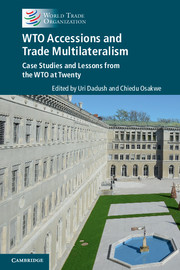Book contents
- Frontmatter
- Dedication
- Contents
- List of contributors
- Foreword
- Acknowledgements
- List of abbreviations
- Editors' note
- PART I WTO accessions, the trading system and the global economy
- PART II Overview: systemic outcomes from accessions
- 9 Contributions and lessons from WTO accessions: the present and future of the rules-based multilateral trading system
- 10 WTO rule-making: WTO Accession Protocols and jurisprudence
- 11 The evolution of the GATT/WTO Accession Protocol: legal tightening and domestic ratification
- PART III Members’ perspectives on accession negotiations
- PART IV Working party chairpersons’ perspectives on accession negotiations
- PART V Salient features inWTOAccession Protocols
- PART VI Conclusion
- Annex: Contributor biographies
- Index
- Plate section
- References
9 - Contributions and lessons from WTO accessions: the present and future of the rules-based multilateral trading system
from PART II - Overview: systemic outcomes from accessions
Published online by Cambridge University Press: 05 November 2015
- Frontmatter
- Dedication
- Contents
- List of contributors
- Foreword
- Acknowledgements
- List of abbreviations
- Editors' note
- PART I WTO accessions, the trading system and the global economy
- PART II Overview: systemic outcomes from accessions
- 9 Contributions and lessons from WTO accessions: the present and future of the rules-based multilateral trading system
- 10 WTO rule-making: WTO Accession Protocols and jurisprudence
- 11 The evolution of the GATT/WTO Accession Protocol: legal tightening and domestic ratification
- PART III Members’ perspectives on accession negotiations
- PART IV Working party chairpersons’ perspectives on accession negotiations
- PART V Salient features inWTOAccession Protocols
- PART VI Conclusion
- Annex: Contributor biographies
- Index
- Plate section
- References
Summary
ABSTRACT
WTO accession still holds a magnetic attraction for non-members. Why is this so, in spite of the challenges faced by the organisation, conclusions by analysts of deadlock in the Doha Development Agenda, assessments that trade policy action has shifted elsewhere to preferential trade arrangements (bilateral and regional trade agreements, including more recently, ‘mega-regionals’) and repeated forecasts about the WTO's ‘irrelevance’ and ‘unravelling’? Systemically, what have WTO accessions contributed to the rules-based trading system through their processes, procedures, best practices and results? What effects have accession negotiations had on domestic reforms in Article XII members? Are there broader lessons for the WTO? This chapter demonstrates that, after the coming into force of the WTO in 1995, results from WTO accession negotiations served to update trade rules continuously (including influencing WTO jurisprudence), enlarged market access opportunities, provided acceding governments with a critical multilateral instrument for legislation-based domestic reforms, and supported geopolitical and geo-economic transformations from centrally planned to market-based economies, the rule of law and good governance. The changes associated with these results were evident from the 1989 fall of the Berlin Wall and the 1991 collapse of the Soviet Union. The evidence strongly suggests that the accession process and its results have established a legal framework for international cooperation, contributed to the global economic transformation of command to market economies and provided a platform for Article XII members to implement their development and modernisation priorities. Overall, the legal, economic and trade policy impact from the deposited Accession Protocols and the process of accession negotiations per se have not only reinforced existing rules and raised the systemic bar, with associated catalytic effect for domestic reforms, but have also staked out the parameters for the future of the rules-based trading system, including a future WTO work programme.
The rules governing the multilateral trading system were last updated comprehensively in 1994 with the results from the Uruguay Round of Multilateral Trade Negotiations. In 2001, the Doha Round was launched based on the rationale of achieving a further clarification, review, reform and update of the rules from previous multilateral trade negotiations and expanding market access to support global economic growth and recovery. From 2005, a systemic message stressed in WTO argumentaires was that concluding the Doha Round negotiations would serve to ‘update’ organisational rules (Supachai and Lamy, 2005; Azevêdo, 2013).
- Type
- Chapter
- Information
- WTO Accessions and Trade MultilateralismCase Studies and Lessons from the WTO at Twenty, pp. 219 - 308Publisher: Cambridge University PressPrint publication year: 2015
References
- 2
- Cited by

